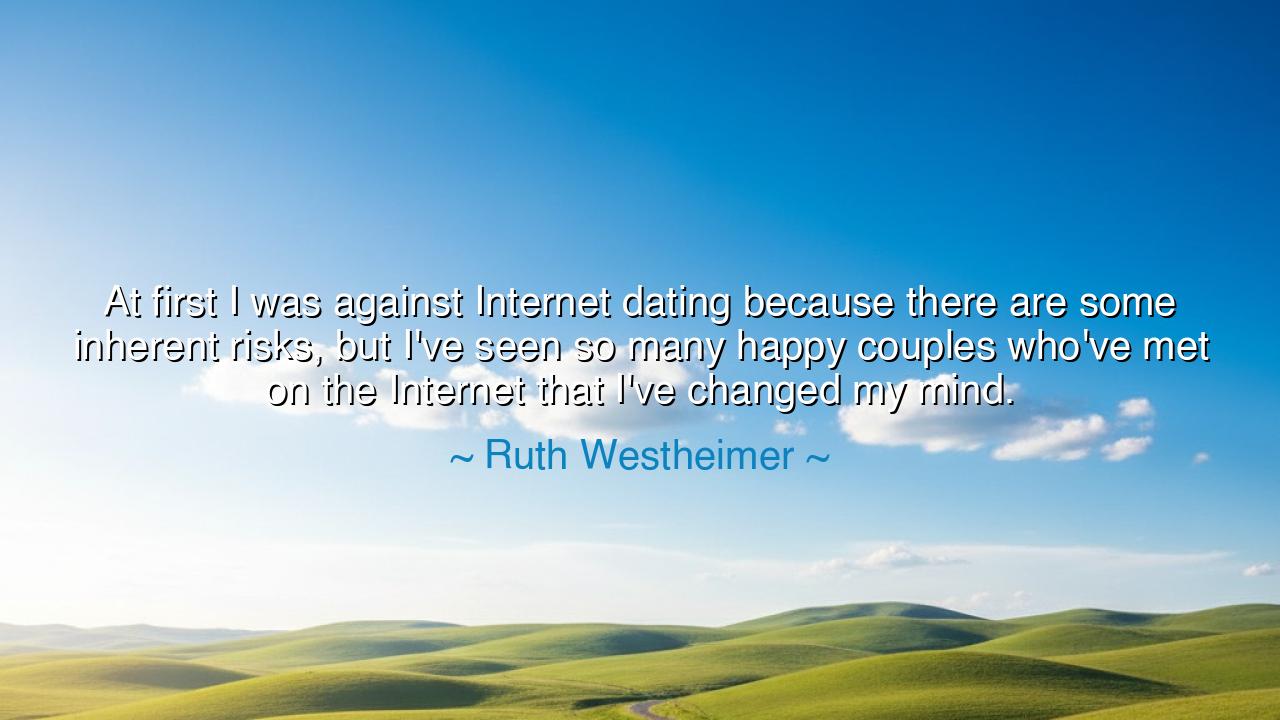
At first I was against Internet dating because there are some
At first I was against Internet dating because there are some inherent risks, but I've seen so many happy couples who've met on the Internet that I've changed my mind.






“At first I was against Internet dating because there are some inherent risks, but I’ve seen so many happy couples who’ve met on the Internet that I’ve changed my mind.” Thus spoke Ruth Westheimer, the wise and compassionate doctor who taught generations to speak of love not with shame, but with courage and joy. Her words, though gentle in tone, carry the depth of a spirit who has watched human connection evolve through ages of fear, hope, and transformation. Within them lies not only an acceptance of change, but a profound truth: that love, like life itself, adapts to the tools of its time, and that open-mindedness is the key to understanding its ever-changing face.
When Dr. Ruth says, “At first I was against Internet dating,” she speaks from the place of caution that every elder and teacher must know — the instinct to protect the heart from harm. In her long career, she had seen the perils of misplaced trust and the vulnerability that comes with longing. The Internet, in its vast and anonymous sprawl, seemed to her, as it did to many, a realm too cold and uncertain for something as sacred as love. Yet even the most experienced among us must learn anew, and she, with humility rare among the wise, allowed the evidence of joy to soften her stance. For she saw that what once seemed dangerous had become, for many, the bridge between loneliness and belonging.
Her transformation mirrors that of the ancients who, too, once feared the instruments of progress. When the first messages were carried by letter instead of messenger, some claimed that love could not survive without voice or presence. When the telephone came, others declared that distance would ruin affection. And yet, in every era, love endured — it found new ways to speak, new means to reach across the void. Westheimer’s wisdom reminds us that the medium does not define the message; it is the sincerity of the heart that gives love its power.
There is a story, told from the early days of the Internet, of two souls who met through words on a glowing screen — a poet and a scientist, bound by curiosity rather than appearance. They lived on opposite sides of the world, but through their written exchanges, they discovered what philosophers once called the meeting of minds. Years later, they met in person, married, and built a life together. Their story, like countless others Dr. Ruth observed, proves that while the tools of connection change, the essence of connection — trust, humor, understanding — remains eternal.
Yet, Ruth Westheimer’s words also bear a note of caution: “there are some inherent risks.” In this, she reminds us that every great pursuit — love, art, knowledge — requires discernment. Just as the sailors of old faced storms on their voyages toward discovery, those who seek love in the digital age must learn to navigate wisely. The risks are real — deceit, disappointment, illusion — yet they are not new. The ancients, too, warned against false charm and empty words. The difference now lies in the speed with which such illusions travel. And so, the wise lover of the modern age must be both open and alert: open to possibility, yet steadfast in truth.
In her change of heart, there is something deeply heroic. To admit transformation — to evolve with compassion instead of fear — is a mark of true wisdom. Dr. Ruth, though grounded in the values of an earlier time, allowed her eyes to see what was new and good. She teaches us that love, in all its forms, should not be measured by tradition, but by sincerity. The world changes, but the heart remains constant — it still seeks warmth, companionship, understanding. Whether found in the marketplace, through a letter, or by the glow of a screen, love’s purpose is the same: to remind us that we are not alone.
So, my children, learn from Ruth Westheimer’s humility and insight. Do not let fear of change rob you of wonder. Use the tools of your age, but use them with wisdom. When you reach out into the vast sea of faces online, do so with honesty and discernment. Let your intentions be clear, your words sincere, and your heart open but guarded. Seek not the perfect image, but the authentic soul behind it.
For in the end, Dr. Ruth’s words shine as both confession and blessing. She once doubted, but she learned — and through learning, she found hope renewed. Her message is this: love is resilient, adaptable, and timeless. It cannot be confined by era or method, only by the limits of our courage. And so, as the ancients would say, “Do not fear the new road, if it leads to the same sun.” Love will always find its way — whether whispered through the stars, or typed upon a glowing screen.






AAdministratorAdministrator
Welcome, honored guests. Please leave a comment, we will respond soon